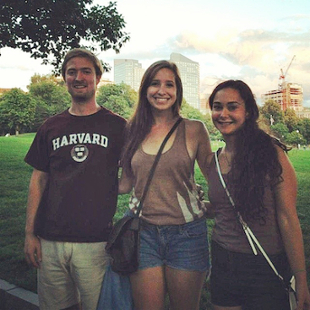Concrete contributions to Harvard research
News
Imagine getting the chance to work with a group of researchers from all over the world in a renowned social psychology laboratory at Harvard. For one James Madison University undergraduate, this dream became a reality.
Christopher Deitrick, a senior psychology major, volunteered as a research assistant this past summer in Dr. Daniel Gilbert’s lab exploring Construal Level Theory.
CLT involves the relationship between psychological distance and the extent to which a person’s thinking is abstract or concrete. High-level construal is when people think abstractly. When thinking on this level, people are looking at the bigger picture, not focusing on details. Low-level construal is when people think more concretely and is associated with psychological proximity. When people are engaged in low-level construal, they are focusing on the present in great detail.
Deitrick explains it this way: When thinking about a forest that is not physically in front of you, you are only thinking about a big landscape filled with greenery. However, if you are 10 feet away from the forest, you tend to see the details of the fallen trees, bark and leaves.
So why is CLT important for us to understand?
“CLT really is applicable to you all the time,” Deitrick said. “You’re constantly thinking about things in either in a psychologically near or distant way. When you become familiar with a theory, you notice it everywhere in your life, and it’s constantly in your thinking.”
Deitrick first became aware of the research opportunity at Harvard in 2013. “I was very impressed by Chris and felt confident that he could be a great addition to Dan Gilbert's lab,” said Dr. Jaime Kurtz, associate professor of psychology at JMU. “I mentioned volunteering in this lab as a possible summer opportunity for him, and he really did the follow-up work to make it happen. His proactive nature is one of his greatest assets.”
After participating in the CLT research lab last year, Deitrick returned to Harvard this summer with the help of a stipend from Psi Chi, the psychology national honor society.
“The social environment there was really rewarding, and it was a huge part of why I decided to go back in the first place,” Deitrick said. “I got to be close to this really diverse group of people from Canada, Spain, Israel and Turkey. It’s a surprisingly international experience, and I got to meet a lot of interesting people.”
Deitrick and his team focused on how CLT relates to social comparisons (when and why we choose to compare ourselves to people around us) as well as how it relates to risk-taking. Their research suggests that when thinking about the long-term implications, people are more likely to think the risk is worth taking. The group’s contributions will become part of scholarly publications in the field.
“Chris is a natural researcher,” Kurtz said. “He understands research methods, is a deeply theoretical thinker, a careful experimenter, and thinks deeply about the implications of research findings. He also has demonstrated a keen interest in topics relating to social psychology, decision making and well-being, all of which were compatible with this project.”
###
Lori News (’15)

